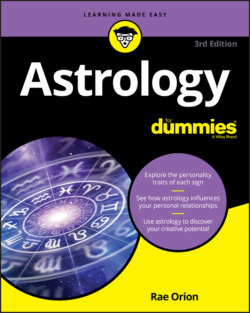Читать книгу Astrology For Dummies - Rae Orion - Страница 11
An Astrological Overview: The Horoscope in Brief
ОглавлениеIN THIS CHAPTER
Picturing the solar system
Rambling through the zodiac
Classifying the signs by polarity, modality, and element
Contemplating the Sun, the Moon, and the planets
Introducing the rulers of each sign
Determining planetary dignities
Discovering the Ascendant
Wandering through the houses
Legend has it that Sir Isaac Newton, one of the greatest scientific geniuses of all time, may have been interested in astrology. Newton had a complex, wide-ranging mind. In addition to inventing calculus, formulating the laws of motion, and discovering the universal law of gravity, he wrote Biblical commentary and speculated about possible dates for the end of the world (all, by the way, in our current century). He experimented with the alchemical quest to turn ordinary metals into gold and may have suffered from mercury poisoning as a result. And he was interested in astrology, claiming that a book he read on the subject while a student at Cambridge University had ignited his interest in science. When his friend Edmund Halley, after whom the comet is named, made a disparaging remark about astrology, Newton, a conservative Capricorn, shot right back, “Sir, I have studied the subject. You have not.” Or so the story goes.
Like every other astrologer, I like to think that story might be true. After all, astrology has faded in and out of fashion, but it has never lacked followers. Twenty-five hundred years ago, Babylonian astrologers were casting individual horoscopes. The Romans consulted astrologers regularly. Emperor Augustus visited an astrologer in 44 BCE, the year Julius Caesar was assassinated, and the orator Cicero, who spoke vehemently against astrology, numbered several well-known practitioners among his friends. In the eighth century, Charlemagne studied astrology under the auspices of an English monk. Catherine de Medici consulted Nostradamus, Queen Elizabeth I sought counsel from the astrologer John Dee, and other astrologers advised Richard the Lion-heart, Napoleon, George Washington, J. P. Morgan, and Ronald Reagan. Yet in all that time, no one has provided a satisfying explanation of why astrology works. Over the centuries, proponents of the ancient art have suggested that gravity must be the motor of astrology … or electromagnetism … or the metaphysical “law of correspondences.” Carl G. Jung summarized that view when he wrote, “We are born at a given moment, in a given place, and like vintage years of wine, we have the qualities of the year and of the season in which we are born.”
I don’t know why astrology works any more than Sir Isaac did. I do know that the pattern the planets made when you were born — your birth chart or horoscope — describes your abilities, your challenges, and your potential. It doesn’t predict your fate, though it does make some fates more easily achievable than others. The exact shape of your destiny, I believe, is up to you.
In this chapter, I give you an overview of the main components of an astrological chart: the planets, the signs, and the houses. You might think of it this way:
The planets represent drives, needs, and basic energies.
The signs represent the ways those forces express themselves.
And the houses represent areas of life such as career, partnership, sex, money, and health.
